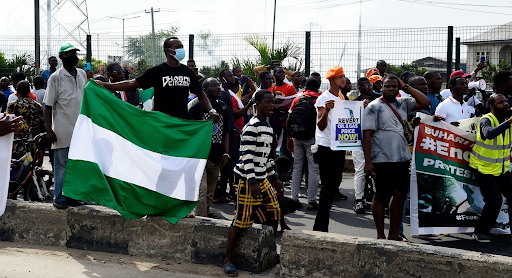Over 300 Fake NGOs Created To Counter Organisations, Individuals Demanding Accountability From Buhari’s Govt – Report
The report revealed that only about seven per cent of the NGOs are registered with the Corporate Affairs Commission. Most of them only operate for a short period through arbitrary calls and press releases for the government to persecute its critics.

A new report has revealed that since 2015, President Muhammadu Buhari administration has sponsored at least 360 NGOs to help cleanse its public image.
Some of the NGOs have also, through arbitrary press conferences, demanded the prosecution of other NGOs and individuals which it deems enemies of the government.
The report, titled “Fake Civil Society: The Rise of Pro-Government NGOs in Nigeria,” was written by Matthew T. Page, a nonresident scholar at the Carnegie Endowment for International Peace.
“Nigeria’s civic space has shrunk in recent years as its government has become increasingly illiberal, heavy-handed, and self-serving. Its kleptocratic elites have grown less tolerant of civil society voices, especially those pushing for better governance, greater accountability, and respect for human rights,” it noted.
Adding that “in a bid to shore up their legitimacy, silence their critics, and expand their patronage networks, Nigeria’s ruling elites have fueled the rise of pro-government NGOs: sycophantic surrogates masquerading as civil society groups. In doing so, they resemble their uniformed predecessors who, in the 1990s, tried to stymie democratization using pro-government NGOs as a tool.”
In 2019, a group called ‘Global Amnesty Watch,’ led by one David Falt, “called on the international community to keenly watch the activities of Amnesty International in Nigeria.” Falt’s demand for “close monitoring” was because of a report by Amnesty International on insurgency and counter-insurgency in the country.
Similarly, Ahmad Salkida, a respected Nigerian journalist, was targeted several times by mushroom groups that faded into hibernation. One of the shadow groups, the Incorporated Trustees of Overt Legacy and Human Development Initiative, had asked the Federal High Court in Abuja to compel Security Chiefs to arrest and prosecute Salkida.
The report said that “out of 360 pro-government Nigerian NGOs identified by this research, 90 per cent have started operating since President Muhammadu Buhari took office in 2015. This correlation suggests that these groups receive high-level support and encouragement. Many are controlled by a small number of individuals who have personal and ethnic connections to Nigeria’s ruling All Progressives Congress (APC).”
In a WhatsApp conversation with The ICIR, Page mentioned that “powerful (Gov’t) officials mainly deal with these entities via their SAs (Senior Assistants), much like they do with favoured journalists.”
He was also unable to identify public contracts executed by any of the Fake NGOs because the “information is difficult to come by without using more investigative tactics.”
“Top military officers’ aides play a similar role. Pro-government NGOs appear to operate sporadically, usually at the behest of their funders.”
The report, in its recommendations, noted that “increased government regulation of Nigeria’s civil society sector is not the solution to the alarming rise of pro-government NGOs. Partisan regulators almost certainly would abuse any new rules, allowing pro-government groups to flourish at the expense of legitimate domestic civil society groups and international NGOs.”
“Instead of creating new rules, the Nigerian government should better enforce existing laws. Nigeria’s tax and anti-corruption agencies could start by investigating pro-government NGOs, almost none of which are legally registered or properly administered.”
The role of media organisations in accentuating these NGOs was not left out in the report either: “Nigeria’s mainstream media outlets should conduct more due diligence when covering previously unknown civil society groups and refuse inducements to attend their events or place stories about them. The country’s many legitimate civil society organizations, meanwhile, could develop a set of voluntary standards that would distinguish them from the disreputable pro-government NGOs,” it recommended.
Support Our Journalism
There are millions of ordinary people affected by conflict in Africa whose stories are missing in the mainstream media. HumAngle is determined to tell those challenging and under-reported stories, hoping that the people impacted by these conflicts will find the safety and security they deserve.
To ensure that we continue to provide public service coverage, we have a small favour to ask you. We want you to be part of our journalistic endeavour by contributing a token to us.
Your donation will further promote a robust, free, and independent media.
Donate HereStay Closer To The Stories That Matter




